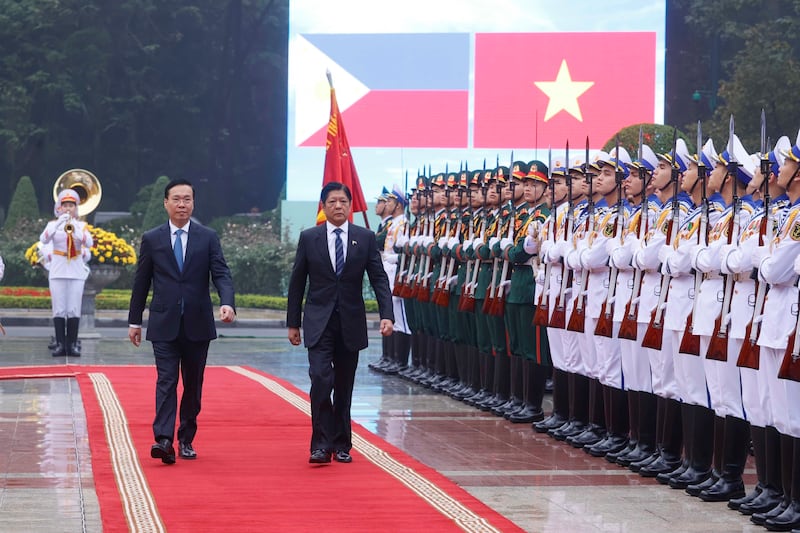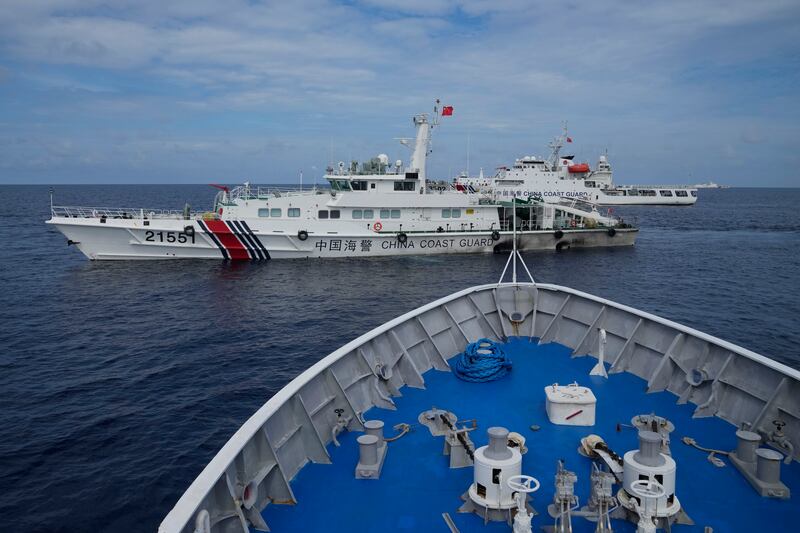Vietnam and the Philippines on Tuesday signed two memoranda of understanding on cooperation in the South China Sea during a visit by President Ferdinand Marcos Jr. to Hanoi, the Philippine Presidential Communications Office said.
One agreement covered incident prevention and management in the disputed waterway. The other was on maritime cooperation, the office said in a news release.
A memorandum of understanding, or MOU, is non-binding and clarifies the parties’ intentions and working relationships.
On incident prevention and management “the two nations agreed to enhance coordination regarding maritime issues bilaterally, within the ASEAN and with other dialogue partners, with both sides intensifying efforts to promote trust, confidence, and understanding, through dialogue and cooperative activities,” the office said.
The MOU on maritime cooperation is “aimed at strengthening the understanding, mutual trust, and confidence between the two parties through development of a Joint Coast Guard Committee” to discuss common issues and interests between the two coast guard forces.
A “hotline communications mechanism” will be established between them, it added. No further details were provided.
Both Vietnam and the Philippines are claimants in the South China Sea, alongside China, Brunei, Malaysia and Taiwan.
Pooja Bhatt, an independent maritime security analyst, said as the risk of escalation caused by competing claims arises, “the ability to resolve mutual disputes amicably demonstrates strength and non-interference of a third party.”
“This is a good solid step even before you face a common challenge or threat,” said the Delhi-based analyst.
“It will also set precedence for other similar maritime disputes that South China Sea littorals face.”
Risk of provoking China
Marcos is in Hanoi on a two-day state visit, during which he's set to meet with Vietnam's top leaders – the president, the prime minister and the chair of the National Assembly – but not the general secretary of the Vietnam Communist Party, Nguyen Phu Trong, who is believed to be in poor health.
Marcos is the first Philippine head of state to visit Vietnam in nearly a decade, after a visit by former president Rodrigo Duterte in 2016.

Before leaving for Hanoi on Monday, Marcos said that maritime cooperation would be “one of the cornerstones of the strategic partnership which we are going to forge” with Vietnam.
The two countries in 2015 established a so-called strategic partnership, the only such association the Philippines has with an ASEAN member state.
Vietnamese media, while covering Marcos’ movements in Hanoi extensively, have so far not reported on the maritime cooperation agreements, which analysts say may risk provoking China.
The official Vietnam News Agency only said that the two sides "pledged to maintain and foster peace, security, stability and freedom of navigation" in the South China Sea.
Beijing claims most of the South China Sea and Chinese vessels have recently had tense confrontations with Philippine coast guard ships near some atolls also claimed by Manila.
“You can see most of the statements about the South China Sea have been issued by the Philippines and not Vietnam,” said a Vietnamese analyst who wished to stay anonymous due to the sensitivity of the issue.
“Manila is keen to get Hanoi involved to form a united front [against China] but Hanoi does not want to publicly show that,” the analyst said.
Bilateral cooperation
Another Vietnamese analyst, however, hailed the agreements on maritime cooperation as “a clever move in breaking China’s dominance by peaceful means.”
“China has been stalling the negotiations for a Code of Conduct [COC] in the South China Sea but step by step Vietnam and other neighbors could cooperate to work out a COC for ASEAN,” Dinh Kim Phuc, a well-known Vietnamese scholar, said.
“Beijing may retaliate by increasing maritime patrols near Vietnam’s oil fields such as the Vanguard Bank, but I don’t think they will react more than that,” Phuc told Radio Free Asia.
In November last year, Marcos said during a livestreamed event that his country was seeking separate risk-reducing agreements with Southeast Asian neighbors.
“We have taken the initiative to approach those other countries around ASEAN whom we have existing territorial conflicts with, Vietnam being one of them, Malaysia being another and to make our own code of conduct,” the president said.
Chinese media, meanwhile, have warned of further risks of conflict should the cooperation between Vietnam and the Philippines “target a third party and harm others' interests.”
The state-run Global Times said that "if Vietnam and the Philippines cooperate in certain areas to the detriment of China's interests in the South China Sea, it will only irritate the situation in the South China Sea and make the risk of conflict higher."

In a related development, an ASEAN foreign ministers meeting in Luang Prabang, Laos, on Monday also discussed the current situation in the South China Sea.
"We reaffirmed the importance of maintaining and promoting peace, security, stability, safety, and freedom of navigation in and overflight above the South China Sea," the bloc's ministers said in a joint statement.
Some of them expressed concern “on the land reclamations and activities, which have eroded trust and confidence, increased tensions, and may undermine peace, security, and stability in the region” without naming any country.
“We emphasized the importance of self-restraint in the conduct of all activities by claimants and all other states,” the statement said, calling on all countries “to pursue peaceful resolution of disputes in accordance with the universally recognized principles of international law, including the 1982 UNCLOS [UN Convention on the Law of the Sea].”
Radio Free Asia is a news service affiliated with BenarNews.
